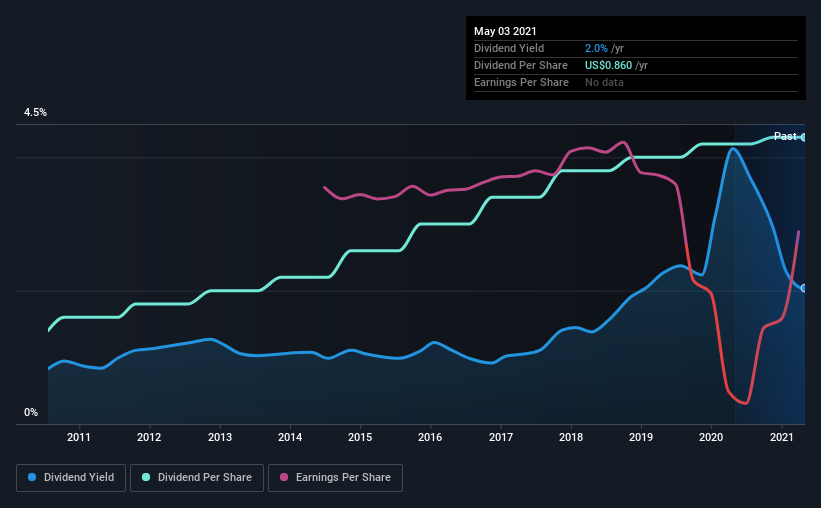Here's Why We're Wary Of Buying Matthews International's (NASDAQ:MATW) For Its Upcoming Dividend
Some investors rely on dividends for growing their wealth, and if you're one of those dividend sleuths, you might be intrigued to know that Matthews International Corporation (NASDAQ:MATW) is about to go ex-dividend in just two days. Ex-dividend means that investors that purchase the stock on or after the 7th of May will not receive this dividend, which will be paid on the 24th of May.
Matthews International's next dividend payment will be US$0.21 per share, and in the last 12 months, the company paid a total of US$0.86 per share. Last year's total dividend payments show that Matthews International has a trailing yield of 2.0% on the current share price of $42.18. Dividends are an important source of income to many shareholders, but the health of the business is crucial to maintaining those dividends. We need to see whether the dividend is covered by earnings and if it's growing.
Check out our latest analysis for Matthews International
Dividends are usually paid out of company profits, so if a company pays out more than it earned then its dividend is usually at greater risk of being cut. Matthews International paid out a disturbingly high 208% of its profit as dividends last year, which makes us concerned there's something we don't fully understand in the business. Yet cash flows are even more important than profits for assessing a dividend, so we need to see if the company generated enough cash to pay its distribution. It paid out 16% of its free cash flow as dividends last year, which is conservatively low.
It's disappointing to see that the dividend was not covered by profits, but cash is more important from a dividend sustainability perspective, and Matthews International fortunately did generate enough cash to fund its dividend. Still, if the company repeatedly paid a dividend greater than its profits, we'd be concerned. Extraordinarily few companies are capable of persistently paying a dividend that is greater than their profits.
Click here to see how much of its profit Matthews International paid out over the last 12 months.
Have Earnings And Dividends Been Growing?
When earnings decline, dividend companies become much harder to analyse and own safely. If earnings decline and the company is forced to cut its dividend, investors could watch the value of their investment go up in smoke. With that in mind, we're discomforted by Matthews International's 27% per annum decline in earnings in the past five years. When earnings per share fall, the maximum amount of dividends that can be paid also falls.
Many investors will assess a company's dividend performance by evaluating how much the dividend payments have changed over time. In the past 10 years, Matthews International has increased its dividend at approximately 12% a year on average. The only way to pay higher dividends when earnings are shrinking is either to pay out a larger percentage of profits, spend cash from the balance sheet, or borrow the money. Matthews International is already paying out a high percentage of its income, so without earnings growth, we're doubtful of whether this dividend will grow much in the future.
Final Takeaway
From a dividend perspective, should investors buy or avoid Matthews International? It's not a great combination to see a company with earnings in decline and paying out 208% of its profits, which could imply the dividend may be at risk of being cut in the future. However, the cash payout ratio was much lower - good news from a dividend perspective - which makes us wonder why there is such a mis-match between income and cashflow. It's not the most attractive proposition from a dividend perspective, and we'd probably give this one a miss for now.
So if you're still interested in Matthews International despite it's poor dividend qualities, you should be well informed on some of the risks facing this stock. To help with this, we've discovered 5 warning signs for Matthews International that you should be aware of before investing in their shares.
We wouldn't recommend just buying the first dividend stock you see, though. Here's a list of interesting dividend stocks with a greater than 2% yield and an upcoming dividend.
This article by Simply Wall St is general in nature. It does not constitute a recommendation to buy or sell any stock, and does not take account of your objectives, or your financial situation. We aim to bring you long-term focused analysis driven by fundamental data. Note that our analysis may not factor in the latest price-sensitive company announcements or qualitative material. Simply Wall St has no position in any stocks mentioned.
Have feedback on this article? Concerned about the content? Get in touch with us directly. Alternatively, email editorial-team (at) simplywallst.com.


